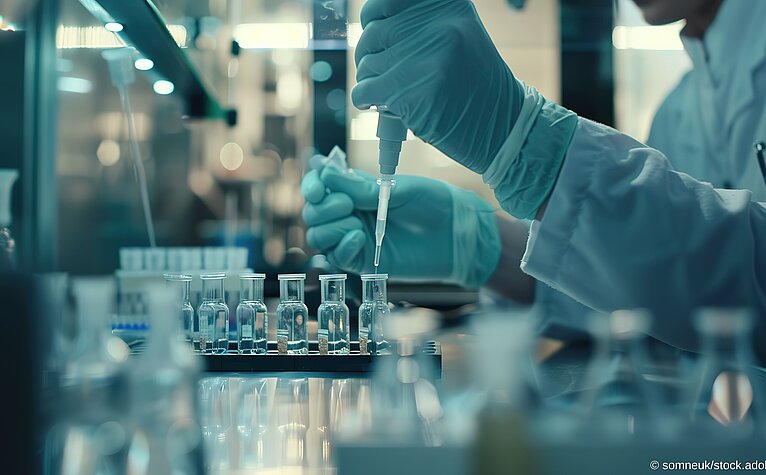 © somneuk/stock.adobe.com
© somneuk/stock.adobe.com
- Location advantages
- Life Sciences
- Research & development
- News
Salzburg and Lower Austria – Two New Hotspots
19. September 2024Life sciences is turning into an important and future-oriented sector in the federal states of Salzburg and Lower Austria, making significant contributions to health, biotechnology and pharmacology. Both regions offer a flourishing environment for companies, research facilities and startups operating in this field.
Not only is music being played here
Salzburg, known for its culture and breathtaking scenery, is emerging as a hotspot for life sciences. 60 companies with 3,000 employees generate revenue of € 1 billion annually. The region benefits from strong networking among academic institutions, such as the Paracelsus Medical Private UniversityParacelsus Medical Private University () (PMU), the Paris Lodron University of SalzburgParis Lodron University of Salzburg () (PLUS) and the University Hospital SalzburgUniversity Hospital Salzburg (). These institutions work closely together with industry to press ahead with innovative research projects in the fields of biotechnology, pharmacology and medical technology.
This collaboration also extends to investments in jointly used infrastructure and new technologies. For example, the project CELLCOMM of the Paris Lodron University of Salzburg recently received approval of € 1.5 million in funding by the Austrian Research Promotion Agency to acquire a highly technological measuring device. This will enable the precise analysis of biological samples by means of “spatial biology” for cancer research purposes. The device comprises a major step forward for cancer research in Salzburg from which everyone involved could benefit, for example the University Hospital Salzburg and the Salzburg Research Cancer Institute.
Another important player in Salzburg’s life sciences scene is Salzburg Research ForschungsgesellschaftSalzburg Research Forschungsgesellschaft (), which focuses on applied research and development. This cooperation between science and business results in innovative solutions, from the development of new therapies to technological innovations, which in turn improve the quality of healthcare services.
Ecosystem from basic research to market maturity
Lower Austria, the largest of Austria’s federal states, has also emerged as a business location for life sciences in recent years. The federal state has state-of-the-art research facilities enjoying an international reputation, for example the Institute of Science and Technology AustriaInstitute of Science and Technology Austria () (ISTA) in Klosterneuburg, Med AustronMed Austron () in Wiener Neustadt and Technopol KremsTechnopol Krems ().
In this case the life sciences sector is also strongly influenced by the close collaboration between academic institutions and industry. The Austrian Institute of TechnologyAustrian Institute of Technology () (AIT) in Seibersdorf and the Technopol programme of EcoplusEcoplus (), the Business Agency of Lower Austria,
play a key role in promoting innovative strength in the region. Technopoles comprise platforms for know-how transfer and knowledge dissemination and are designed to promote regional and international cooperation. Initiatives such as these not only support established companies but also startups pressing ahead with new developments in the fields of biotechnology, medical technology and healthcare.
One exciting young company is Saphenus Medical Technology. It was founded in 2016 and conducted research with leading scientists on the world’s first feeling prosthesis. This revolutionary medical product won numerous grants and awards and became the very first Austrian company to be funded by the EIC Accelerator of the European Commission. The Lower Austrian company also worked on the development of its feeling prosthesis together with Salzburg Research, one example for the close and successful collaboration of different players within Austria. Starting this year Saphenus has also been cooperating with the renowned Harvard Medical School on developing innovative approaches to amputation technology.